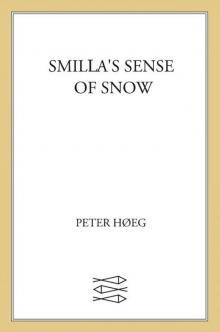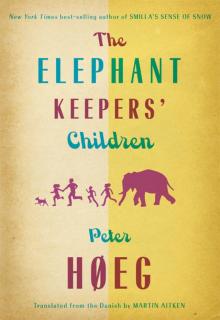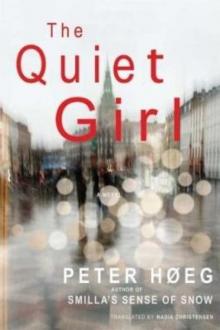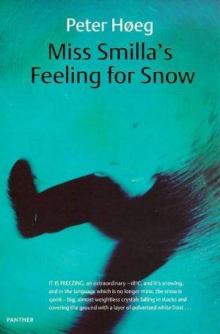- Home
- Peter Høeg
The Woman and the Ape Page 17
The Woman and the Ape Read online
Page 17
For a long time this question seemed to answer itself by fading away and then vanishing altogether. There was nothing in Madelene’s and Erasmus’ life to suggest that it would not last forever, that this idyll of theirs was not to be depended upon.
In the mornings when they woke the garden was covered with a dew that caught and refracted the light like a mother-of-pearl veneer. Every leaf on a tree curled like an open pearl oyster around its own drop, the tree trunks were moist and slippery and when they walked hand in hand down to the river through the grass they seemed to be walking through cool, shallow waters on which lily of the valley floated like water lilies and from which the flowering meadowsweet rose like standing liquid columns. Down by the river they met the other animals in the garden, and at this time of day in this underwater world all natural enmities were suspended. Sable antelopes drank alongside elephants, alongside a cheetah, alongside a capybara, alongside a reddish-gray and white sarus crane, alongside a group of red lemurs. Even the monkeys held their peace and at times such as these the garden showed that side of itself which so many had dreamt of but so few had seen: in Old Testament harmony.
While Erasmus and Madelene washed, daylight broke. Not gradually but all of a sudden, and in a cloud of mist it swept the waters aside. Then came the heat, the sounds, the smells, and then the garden’s heartbeat escalated from its resting pulse to its maximum rate.
Around noon a short hiatus occurred, not out of lethargy but because so great was the intensity of the place that every living thing in it had need of a break. Madelene and Erasmus rested then too, in their tree, on their air mattresses, and often when they awoke they would just sit there, sit quite still, surveying the burgeoning life around them. The fiery rays of the red lemurs, flashing like miniature comets through the treetops. Birds of paradise like some divine joke, three feather boas knotted together and tossed into the air. The stillness of the cheetah, its infinite patience, its impossible, slingshot acceleration. The indefatigable industry of the she-gorillas. The dominant males’ endless forbearance with the young ones. The wariness of the field mouse, a wariness so unconfined that it prompted Madelene to think that here at last was a creature which was undeniably more afraid than she had ever been. They witnessed the extremes of the adder, from deathly inertia to movements too swift for either Madelene’s or the ape’s eyes. One day a golden eagle flew over their heads—first high above, rectangular, like a flying door, then quite close—and this time Madelene did not wave, this time she simply thought: We are just like it.
They ate early in the evening. When darkness began to fall the ape lit a fire in the fork of a tree, a tiny fire, for all the world as if it had grabbed a fistful of flame from the sun now fading from view. Not setting—for in recent nights even the sun had seemed too elated to go down—but withdrawing behind the midnight-blue membrane of the skies on which throughout the long, light night it would recline, permeating it with a luster that would filter down to the dark earth in the form of a reddish-gray glimmer of light.
In this life there was no time—or at least only of a sporadic and soon forgotten sort—and hence no question of duration, and so Madelene and Erasmus lost all interest in the problem of how long. They lost interest in time.
* * *
The truth, when it presented itself, sneaked up on them all unnoticed like a beast of prey one noontime, in the shade, in the middle of a lesson.
They had abandoned any idea of a systematic approach to their language lessons. Madelene had stopped trying to call to mind the fragments of grammar she had once learned and they were now journeying through language on instinct. She would gauge where the ape had not yet been and take it there. On this particular day she had conducted it to the Danish conditional conjunctions.
“If I could,” said the ape, “I would fly.”
“If I could,” said Madelene, “I would fly with you.”
“If we could,” said the ape, “we would stay here forever.”
At this Madelene felt the earth give way and sensed that it was too late to turn back.
“If we wanted to,” she said, “couldn’t we?”
The ape shook its head.
“There are all the others, you see,” it said.
They fell silent. They listened in disbelief to the echo of what they had said.
They were less than a yard apart. A space now populated by living creatures, by apes like Erasmus. In a vision, a shared mirage, they saw a congregation of apes, a body of apes, a nation. Madelene could tell that Erasmus was every bit as overwhelmed as she herself was. That the reason he had not spoken about the future was that, like her, he had forgotten it. But somewhere there were hundreds of apes like him, maybe even thousands. Their existence must be threatened. And he, with his insight, must owe them something. His situation differed from her own. Her departure from civilization had been a quite definitive one. She had put everything behind her. There was not one soul on earth with whom she had shared anything she feared to lose.
Once she had thought this far the space before her grew very crowded. Between her and Erasmus, mingling with the imaginary apes, there appeared a new group, a group of people. In the forefront, Adam and Madelene’s parents and Susan and her children, and behind them other acquaintances, relatives, forgotten school friends, and behind them again the faceless silhouettes of people who had once meant something to her. All of them were looking at her, like children who have asked a grown-up a question and not yet been given an answer.
“Yes,” said Madelene. “The others. We’d almost forgotten them.”
What they hit upon, both together, at that moment was a natural law that always takes the form of a reminder, a law that has prevailed through every hermit and stylite regardless of religion or historical era and revealed itself to each and every pair of lovers. It is the reminder that there is no such thing, nor can there ever be any such thing, as a private Paradise.
Madelene shut her eyes and took a deep breath.
“What do you call yourselves?” she asked. “I mean, you don’t say ‘apes,’ do you?”
The ape thought this over, trying vainly to reconcile two irreconcilable languages before coming up with an acceptable compromise.
“People,” it said. “We call ourselves people.”
“And us? What do you call us?”
“Animals,” said the ape, “is what we call you.”
Madelene opened her eyes.
“Do you miss them?” she asked. “Your people?”
The ape did not answer her straight out.
“Princesses,” it said, “what was it they were again?”
For seven weeks Madelene had been living in one flowing here and now. It was with some reluctance that her memory began once more to function.
“Chosen,” she said. “That there’s something you have to do.”
The ape nodded.
“There’s something I have to do,” it said. “That’s why I came.”
Around them the garden hummed, warm and drowsy. Everything was as before. But nothing would ever be the same again.
“The animals,” said the ape, “here in the garden, they don’t know what to make of us. That’s why they’re afraid of us. Why they run away. In order to stay invisible they run away. It’s a good way of doing it. Something we all have to learn. But there’s another way too. If you understand what is coming you don’t need to run. You can hold your ground, hold it even at close range, and still be invisible. Because you know where to stand. That’s how we live—we people.”
“Are none of you ever seen?”
“It might be that we’re sensed. It might be that your people sense us. As something missing. Or as something that ought not to have been there. But you don’t see us. And even if you do, you still don’t see us.”
Madelene threw the last shred of caution to the wind.
“Was it a good life?” she asked. “Were you happy? Are the others happy?”
The ape nodded.
&n
bsp; “And yet you are here,” she said. “But maybe that was a mistake.”
The ape drew itself up, with unquestionable arrogance it drew itself up and in a flash Madelene recalled the stiff-legged strutting of the male gorillas.
“Erasmus,” it said, “allowed himself to be caught.”
“And what about me?” said Madelene. “I suppose I was just meant to lend you a hand?”
It was a quiet remark, and those are the most difficult of all to answer, especially in a language other than one’s mother tongue. But Erasmus had learned a great deal and to his lessons he had brought some of his physical agility.
“When we go down to the river to drink,” he said, “sometimes, quite often, the sun appears. Even though that wasn’t what we were after. Now and again, when you go looking for something small, you come up with something big.”
Madelene shut her eyes, savoring her lover’s rapidly progressing eloquence like a ripe peach.
“Even if one is content,” the ape went on, “even if it was, even if it still is a good life for us, even if we are quite, quite content, there would still be, there are, always … the others, your people.”
They looked at one another and knew that they had arrived at the answer to the garden’s final question. They said not another word. They had reached the outer limits of language, and what now occurred, the last stage of their journey, its farthest point, was wordless. They sat on a promontory, a linguistic ultima Thule, and what they espied far off in the distance were the contours of an answer to their question: Why can’t two people or a band of apes shut themselves off in Paradise?
They discerned that this question is part and parcel of a bigger, a much bigger one: Why hasn’t everything gone on being the same as it was in the beginning, why is the paradisiacal condition not a steady state?
The answer one arrives at depends on the point from which one asks the question, and Madelene and Erasmus asked it from a position seventy-five feet above the ground in the Garden of Eden, sitting hand in hand on two air mattresses, and the answer they reached in the same breath was that when the world starts to move it does so thanks to love. They saw—they thought they saw—that either above or below them there sat a god, perhaps the Almighty, holding something or someone by the hand, perhaps an ape, and was happy and for that very reason could by no stretch of the imagination be sufficient unto himself.
part four
one
If, on that July evening, one had come gliding in over London and dropped down toward the city, close enough to make out the facial features of isolated individuals, one would at that distance have gained the impression that the city had forgotten Erasmus and Madelene. That it had picked up the threads of its life again as if nothing had ever happened.
In South Hill Park, at Mombasa Manor, Adam Burden stands before his bedroom mirror rehearsing something or other, something reminiscent of a conjuring trick, something which evidently calls for practice and a clear idea of the positioning of one’s audience and of what they may and may not be permitted to see. Working away at this he seems quite his old self again, with all the assurance of a seasoned trouper.
Elsewhere, in Mayfair, Andrea Burden is in the act of trying on a hat, again in front of a mirror, looking as though she has not a care in the world, radiating serenity and vitality.
At the other end of town, at Millwall Dock, at the very back of a pub situated at the very end of a narrow side street, Johnny peers down into the bottom of his beer glass. It is not so much his own dispirited reflection he is staring at but rather as though he were gazing out across that Sea of Futility which has for so many years been lapping at his feet and upon which he has now finally abandoned all hope of ever reaching land.
Some way from there, on the outskirts of the Isle of Dogs, the man who until not so long ago had gone by the name of Bally is gazing down into the Thames just at the point where it flows past the boat which not so long ago was called the Ark but which has now taken a new name, and the look on his face is, as it has been for many years, equable and inscrutable.
On the opposite bank of the Thames, at veterinary police HQ next to St. Thomas’s Hospital, Inspector Smailes gets up from his chair and walks over to the window. What he is contemplating is not to be found beyond the glass; what he is staring at with something akin to jaded routine is his own face in the windowpane.
In another office, much bigger, in the Holland Park Veterinary Clinic, sits Alexander Bowen, jittery as ever, clutching a telephone receiver. He has dialed a number but this call goes—as is so often the case with telephone calls—unanswered. There is no one at the place he has called to answer, no one apart from Firkin, the veterinary odontologist, who is wandering up and down through suite upon suite of offices and laboratories paying no heed to the instrument’s peal. He has stayed on at the Institute long after the end of his working day but even that, under normal circumstances, would give no cause for wonder.
At this distance, at such close range, it is as though Madelene and Erasmus had never existed.
But if one pulls back, just a little farther back, a new picture comes into focus.
* * *
Adam Burden has been made the new director of the New London Regent’s Park Zoological Garden. He was elected to great acclaim, not one voice raised against him. His reputation as a scientist and his curriculum vitae are impeccable, he has the support of Andrea Burden and all the animal protection societies, he has the backing of the investors, he has the Department of National Heritage’s seal of approval and comes recommended by the Royal Zoological Society. Furthermore, due to that dreadful incident with his wife he has the warmest sympathies of the public and the media. At the end of July—a week from now—he will be officially inducted into his new post.
It is his induction he is now rehearsing. This will be held in the assembly hall of the new zoo, in the presence of representatives of Her Majesty’s Government, the patron of the Royal Zoological Society, Her Royal Highness Princess Anne, and other members of the royal family.
The subject of his speech will be Erasmus.
This will be one of the most momentous zoological speeches of the twentieth century. The totally unforeseen disclosure of the discovery of a new and hitherto unknown mammal, an apparently highly intelligent anthropoid ape. His speech will be supplemented by slides, drawings, the brain-scan results, a complete anatomical description of Erasmus, a physiochemical analysis of his feed, excreta and metabolism, an outline of his behavioral pattern and a genetic record compiled by the DNA laboratory at the Institute for Population Biology. It is Alexander Bowen who is supposed to furnish this last-named record but as yet it has not been forthcoming, hence his call and his impatience. The DNA laboratory is attached to the Institute of Animal Behavioral Research—where Firkin works. Which is how Firkin caught wind of the inquiry. Which is why he is roaming the laboratories after office hours.
Firkin is thinking about the ape and about Madelene. Since their disappearance he has not been able to get them out of his head. Nor has Inspector Smailes, and it is the unpleasantness of the memory of them, of the feeling of something left unresolved, that moves the inspector to gravitate toward his own reflection.
Once the scientific proof has been produced it is Adam’s and Andrea’s wish that one particular testimony dealing with the circumstances surrounding the ape’s capture should be presented and it is the man formerly known as Bally who is to present it and it is for doing this that his boat and his liberty have been restored to him. There is, however, another testimony—having to do with Bally’s true identity and how the ape actually arrived in London—which must absolutely not be given, and therefore one person who must on no account show his face, that person being Johnny, and as an incentive to staying well out of it he has received a number of threats and a sum of money which he is now in the process of drinking away. Johnny has been on the bottle for seven weeks, ever since Madelene and Erasmus disappeared, and whereas other people will take as much
as twenty years to drink themselves to death Johnny has displayed such a unique talent for alcoholism that as far as he is concerned it looks as though the process is going to be speeded up considerably.
This speech is not only scientifically unique, not only the most critical of Adam’s career. It is also of crucial importance to Andrea Burden. It is going to supply the zoo with its first official credentials. It will be made clear that it was this new zoo and its scientific resources which made the discovery and detailing of the new ape possible.
The speech will conclude with the announcement that the New London Regent’s Park Zoo is to include a large—a vast—enclosure for apes like Erasmus, an ape island. And, last of all, Adam is going to name the new ape not—as has been the custom—after whoever discovered the animal, or after certain characteristics of the animal, or after the place where it had been found. Instead it is to be named after the place where it would be on display forevermore, home of the zoological pioneers who had unearthed it from its hiding place, site of the scientific bodies that had been the first to classify it. Erasmus was to be known as Homina londiniensis.
So, at such a remove, there can be no doubt that for these people everything over the past seven weeks has revolved around Erasmus and Madelene.
Or rather, around what they would like to remember them for. And around what they have dared to remember. Because there are some things, particularly concerning the moment when the ape sprang aloft with Madelene and disappeared, which they are trying to forget, things which—were they to rise to the surface—would ruin the impression of sensational credibility which Adam’s speech is meant to create.
The woman and the ape have gone. Now it is a matter of getting the best possible mileage out of the trail they have left.
* * *
But Madelene and Erasmus have not gone. They are closer than anyone imagines, crouched on the edge of a wood atop a ridge overlooking Edgware, in northwest London. And from this point the city presents a third view of itself. From here its concrete silhouette arches into a dome not unlike the skull of a malevolent gnome creeping out from under the stone beneath which it has lain for two thousand years, to find a butterfly and rip off its wings.

 The Woman and the Ape
The Woman and the Ape Smilla's Sense of Snow
Smilla's Sense of Snow Borderliners
Borderliners The Susan Effect
The Susan Effect The History of Danish Dreams
The History of Danish Dreams The Elephant Keepers' Children
The Elephant Keepers' Children The Quiet Girl - Peter Hoeg
The Quiet Girl - Peter Hoeg Smilla's Sense of Snow aka Miss Smilla's Feeling for Snow
Smilla's Sense of Snow aka Miss Smilla's Feeling for Snow